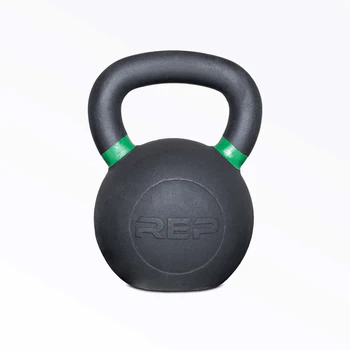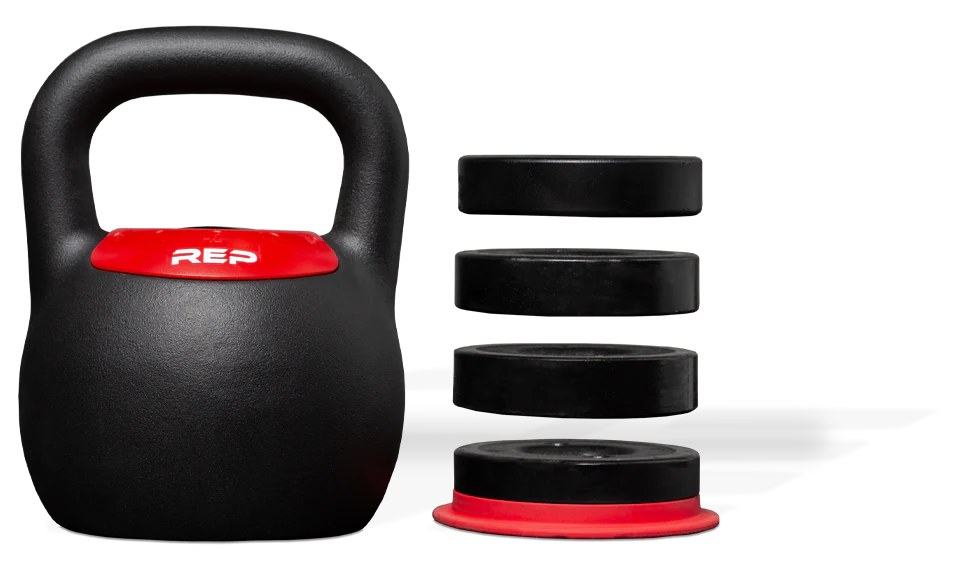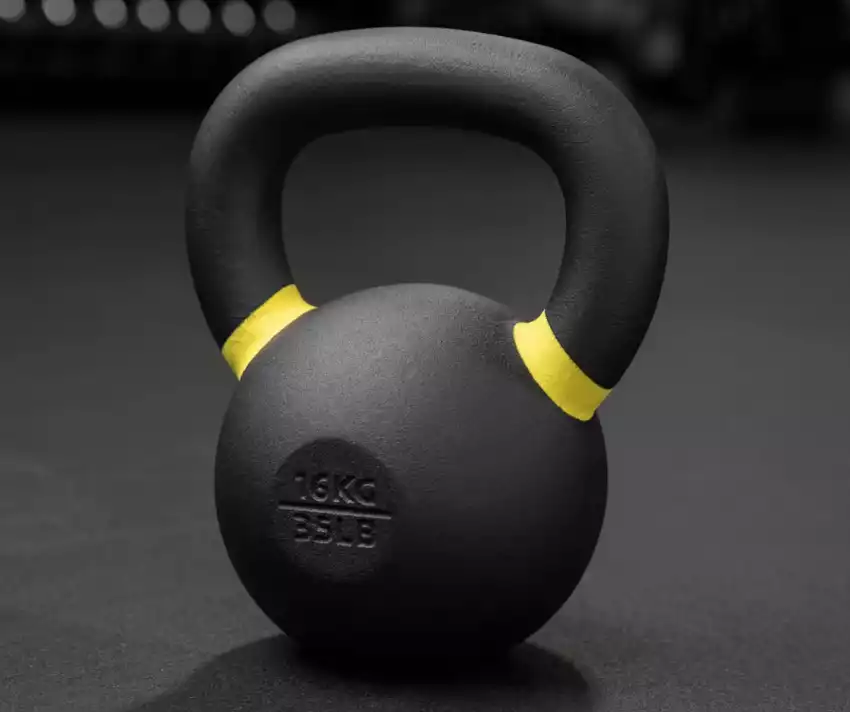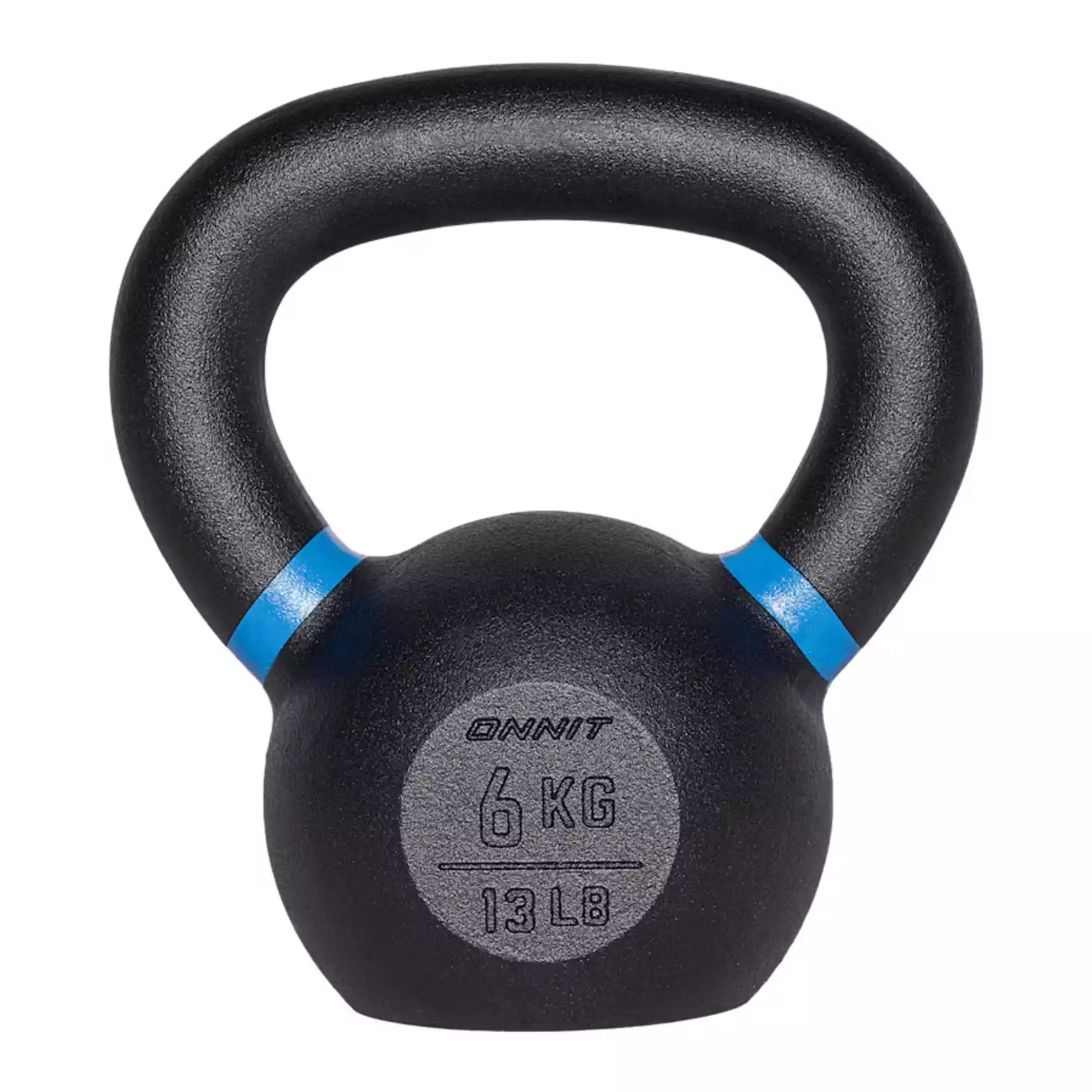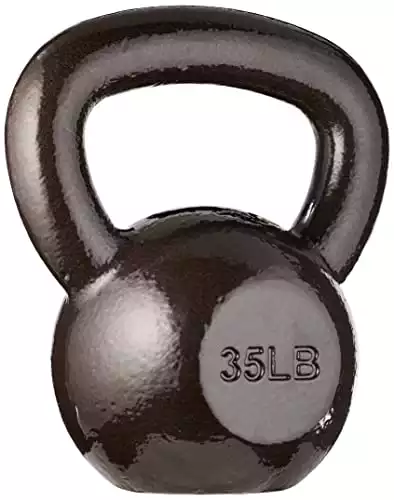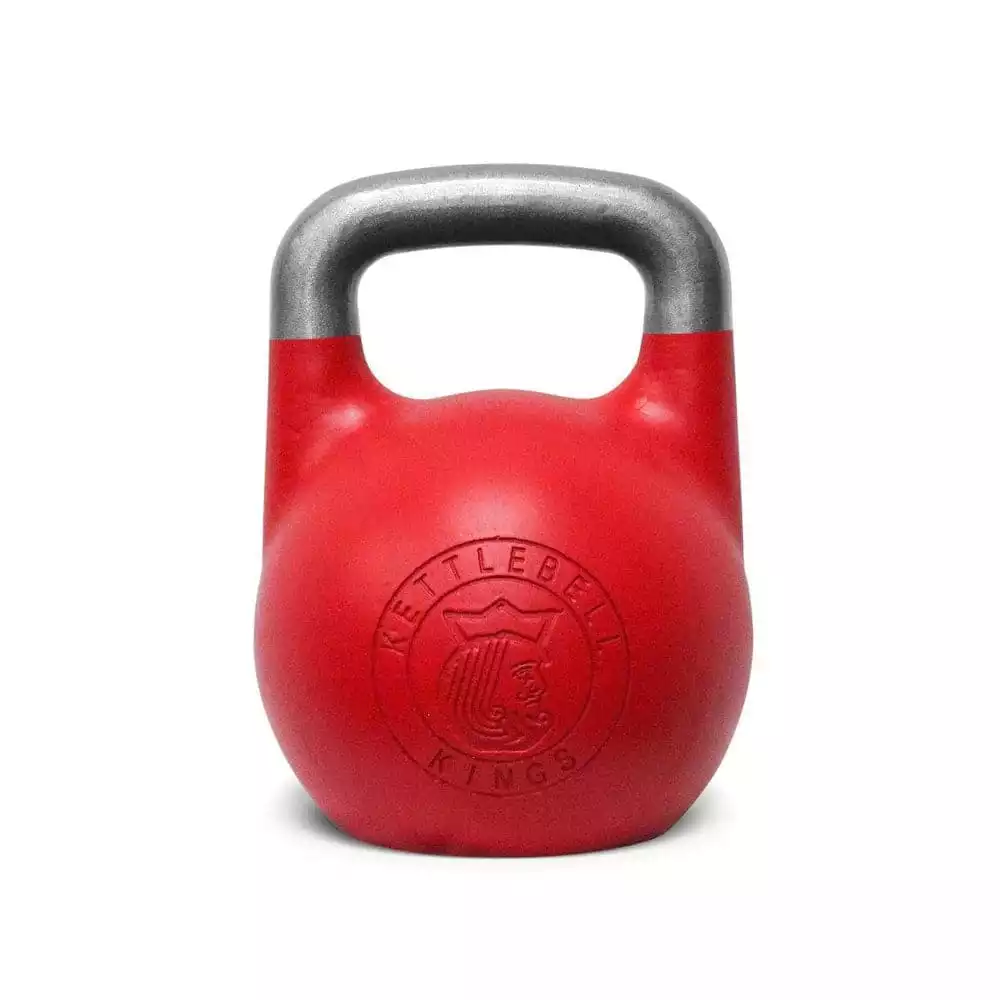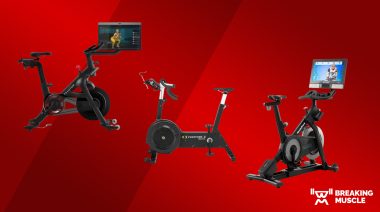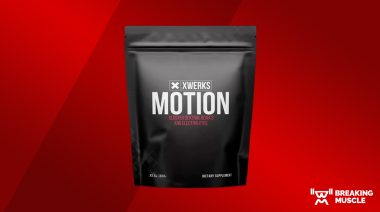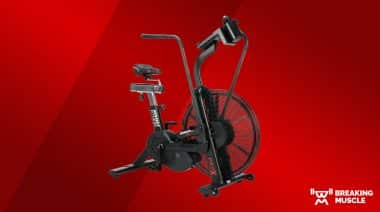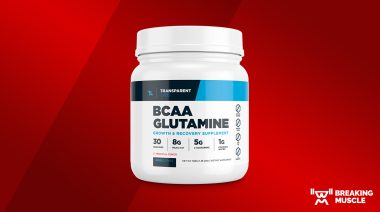If you’re looking for a way to get in shape at home, kettlebells are some of the best pieces of fitness equipment you can buy. They’re great for cardio or strength training and, due to their shape and how the weight is distributed, provide a different stimulus on your muscles than dumbbells. Plus, they’re suitable for every fitness level since most kettlebell exercises are easy to learn.
In this article, I’ll review our picks for the best kettlebells and discuss the benefits of training with kettlebells, the differences between kettlebells and dumbbells, and the best exercises to do with kettlebells. I’ll also provide a guide on what to look for when buying kettlebells, so you can easily narrow down your search and find the right option for you.
Check out our round-up of the best Black Friday fitness deals.
Our Top Picks for the Best Kettlebells
- Best Overall Kettlebell: REP Fitness Matte Kettlebells (KG)
- Best Adjustable Kettlebell: REP Fitness Adjustable Kettlebells
- Best Kettlebell for CrossFit: Rogue Fitness Kettlebells (LB)
- Best Kettlebells for Beginners: Onnit Kettlebells
- Best Kettlebells on Amazon: Amazon Basics Cast Iron Kettlebell
- Best Competition Kettlebells: Kettlebell Kings Competition Kettlebell
Best Overall Kettlebell: REP Fitness Matte Kettlebells (KG)
- Weight range: One kilogram to 48 kilograms (2.2 to about 106 pounds)
- Materials: Cast iron
- Handle diameter: 30 to 40 millimeters
Pros
- Color-coded handles allow you to identify the weight easily
- Matte coating helps prevent chips
- Gravity-cast construction offers enhanced durability
- Comes with a lifetime limited warranty
Cons
- Not rust-resistant
The REP Fitness Matte Kettlebells get the award for best kettlebells overall because their gravity-cast construction offers superior durability, the matte finish makes them easy to grip with or without chalk, and they come in a wide weight range (one kilogram to 48 kilograms, or 2.2 to about 106 pounds).
Each kettlebell is made by pouring iron into a single mold using the force of gravity. There are no multiple parts welded or molded together, so you get a sturdy product that’s less susceptible to breaking. However, on the off chance that your kettlebell does get damaged when used in a home gym setting, you can take advantage of REP’s limited lifetime warranty to replace it.
The kettlebells have a completely flat bottom, which prevents them from wobbling when you store them or set them on the ground during your kettlebell workout. The handles are color-coded for easy weight identification, and the bell displays the weight in both pounds and kilograms, so you don’t have to worry about doing manual conversions during your workouts.
While the matte coating offers a non-slip grip and helps prevent chips or scratches, it doesn’t make the kettlebells completely rust-resistant. You’ll need to be careful about wiping sweat off them and not leaving them exposed to moisture if you don’t want them to develop rust.
Best Adjustable Kettlebell: REP Fitness Adjustable Kettlebells
- Weight range: Eight to 16 kilograms (17.6 to 35 pounds); 16 to 24 kilograms (35 to 53 pounds); 20 to 40 pounds
- Materials: Cast iron, nylon thermoplastic
- Handle diameter: 33 millimeters
Pros
- Quick and easy adjustment mechanism
- Matte powder coating for a strong grip
- Rubber bottom protects your floors from damage
Cons
- May not be heavy enough for advanced athletes
If you’ve done any research on the best products for small home gyms, you may already be aware of the top adjustable dumbbells available on the market. Adjustable kettlebells like the REP Fitness Adjustable Kettlebells offer the same space-saving benefits for anyone who wants access to a wide range of weights but doesn’t have room for multiple kettlebells.
What I like about the REP Fitness Adjustable Kettlebells is that the size of the bell stays the same even as you go up in weight. With other adjustable kettlebells, the base can become bulky because you add small weight discs to the bottom to increase the weight. With the adjustable kettlebell from REP, the weight inserts go inside the bell. This ensures the base stays the same size regardless of how much weight you add, making it easier to handle the bell for swings, snatches, and other kettlebell exercises.
I also like that this adjustable kettlebell feels like a traditional kettlebell, thanks to its cast iron exterior and matte powder coat. The powder coat allows you to get an excellent grip, even when your hands get sweaty, and holds chalk well to prevent your hands from slipping.
The REP Adjustable Kettlebell comes in three sizes: eight to 16 kilograms (17.6 to 35 pounds), 16 to 24 kilograms (35 to 53 pounds), and 20 to 40 pounds. The kilogram kettlebells go up in weight in two-kilogram increments, while the 20- to 40-pound kettlebell increases in weight in five-pound increments. A plastic dial lets you adjust the weight quickly, so you won’t waste precious time fiddling around with the inserts during your workouts.
Best Kettlebell for CrossFit: Rogue Fitness Kettlebells (LB)
- Weight range: Nine to 203 pounds
- Materials: Cast iron
- Handle diameter: 1.2 to 1.58 inches
Pros
- Large weight range
- Matte finish offers a strong grip and rust protection
- Holds chalk well
- Single-cast process ensures there are no small parts that can break easily
Cons
- Expensive
I’ve used the Rogue Kettlebells in both commercial and home gym settings, and I’ve been impressed with their durability and performance. The one I own now shows no signs of damage or rust despite being stored in my humid garage, and the ones I used at the CrossFit gym I used to belong to withstood heavy, near-daily use for years.
Made with cast iron using a single mold, the Rogue Kettlebells feature a matte black powder coat finish and a flat base. The manufacturing and finishing process results in reliable kettlebells that hold chalk well and don’t wobble when resting on the floor or a storage rack. I use my Rogue kettlebell without chalk frequently and never have to worry about my hands slipping.
The kettlebells start at nine pounds and go all the way up to 203 pounds, so they’re suitable for any experience level. The bell displays the weight in pounds and kilograms, but the handles are also color-coded for easy identification. Starting at around $1.58 per pound, they’re not the cheapest kettlebells available, but the price is worth it if you want a kettlebell that will last for years in a home or commercial gym.
RELATED: Best Home Gym Machines
Best Kettlebells for Beginners: Onnit Kettlebells
- Weight range: 13 to 70 pounds
- Materials: Cast iron
- Handle diameter: Not listed
Pros
- Gravity-cast manufacturing process ensures durability
- Powder coated finish allows you to maintain a good grip with or without chalk
- Free workouts available on Onnit’s website
- Color-coded handles
Cons
- Expensive
Onnit is known primarily for its nutrition products and produces some of the best creatine supplements and best whey protein powders we’ve tried. The company also makes a small amount of fitness equipment, including kettlebells, and publishes free workouts to help beginners get started with a kettlebell routine.
The kettlebells are available in weight options from 13 to 70 pounds, a smaller range than other brands offer but still sufficient for most newbies. They feature color-coded handles, so if you buy more than one, you can quickly determine the weight you want to use. The bright colors also make it easier to grab the same weight if you’re using two kettlebells in your workouts.
They’re more expensive than other kettlebells on the market, but not by much. Their quality rivals that of the kettlebells made by more popular brands like Rogue, so the price is justified. They’re made using a gravity-cast molding process, which ensures a durable finish and a smooth texture that feels comfortable in the hands. The only reason you may need to replace them is if you want to go heavier than 70 pounds.
Best Kettlebells on Amazon: Amazon Basics Cast Iron Kettlebell
- Weight range: 15 to 40 pounds
- Materials: Cast iron
- Handle diameter: Not listed
Pros
- Affordably priced
- Textured handle to help improve grip
- Free shipping for Prime members
Cons
- The handle can be slippery
- Enamel coating can chip easily
If you’re shopping for kettlebells on Amazon, the Amazon Basics Cast Iron Kettlebells are an excellent choice. They’re not quite as high-quality as the kettlebells from premium brands like Rogue or Kettlebell Kings, but they get the job done and are suitable for most full-body workouts you want to do at home.
The kettlebells are made with solid cast iron and coated with enamel. The enamel gives the kettlebells a shiny, glossy appearance, but it can feel slippery once your hands start to sweat. There is some texture to the handle to help mitigate this, but your grip won’t feel as secure as it would on a powder-coated kettlebell. And even though the enamel offers protection against corrosion, it can chip easily.
One of the most attractive features of the Amazon Basics Cast Iron Kettlebells is the price. Starting at around $1.00 per pound, they are some of the most affordable kettlebells we’ve seen. If you’re an Amazon Prime member, you also get the benefit of free shipping, which is a big deal since shipping charges from other brands can cost $20 or more.
Best Competition Kettlebells: Kettlebell Kings Competition Kettlebell
- Weight range: Eight to 48 kilograms (18 to 106 pounds)
- Materials: Steel
- Handle diameter: 35 millimeters
Pros
- Single-cast construction produces a stronger, sturdier bell
- Bright colors allow you to quickly identify the weights
- Made with steel, which is more durable than cast iron
- Porous handle for better chalk absorption
- Lifetime warranty
Cons
- Expensive
As I’ll discuss below, competition kettlebells differ from standard kettlebells in several ways. If you’re a kettlebell sport athlete, a competition kettlebell will allow you to train with the same piece of equipment you’d use in a competition. Kettlebell Kings is the brand to go with because its kettlebells are durable and meet international competition specifications.
Kettlebell Kings Competition Kettlebells are available in weights from eight kilograms (18 pounds) to 48 kilograms (106 pounds). Regardless of the weight, each kettlebell has a 35-millimeter handle and is the same size. The uniformity enables you to utilize the same technique whether you use a heavy or light kettlebell. The only thing that differs as the weight increases is the color of the bell, which is dictated by a universal color coding system.
Like standard kettlebells, the Kettlebell Kings Competition Kettlebells have a flat base to ensure stability when you store them or place them on the ground. They also have a porous handle that absorbs chalk more effectively and offers a secure grip whether you perform single- or double-handed kettlebell movements.
If you have a tight budget and don’t compete in kettlebell sport, you may want to consider a different kettlebell. The Kettlebell Kings Competition Kettlebells cost more than most other options because they have to be manufactured to competition standards. They’re also made with steel, which is more expensive than cast iron. For recreational use or at-home workouts, any of the other kettlebells on this list is sufficient.
How We Chose the Best Kettlebells
We researched and analyzed dozens of kettlebells to create the list above and also included kettlebells we’ve used ourselves in home or commercial gyms. To ensure we covered as many scenarios as possible, we selected options for both recreational and competitive kettlebell athletes and chose products with wide weight ranges. We also selected kettlebells with varying price points, so you can find an option that works for you regardless of your budget.
Benefits of Training With Kettlebells
Kettlebells are some of my favorite implements to train with because they’re effective at improving both strength and cardio, and they provide a unique challenge that you can’t replicate with barbells or dumbbells.
Below are some of the most significant benefits of kettlebell training:
- Kettlebells are versatile. You can use kettlebells for full-body strength or cardio routines. They are interchangeable with dumbbells for most exercises (some of which I’ll cover below) and are great for high-intensity interval training (HIIT) workouts.
- They can help you develop explosive power. Exercises like kettlebell swings and snatches are fantastic for building power because they require you to move heavy weights quickly.
- They can help you improve your grip strength. Kettlebells often have a thicker handle than dumbbells, which is more challenging on your grip and forearm muscles.
- Kettlebells can strengthen your stabilizer muscles. Because a kettlebell’s weight is centered below the handle, you have to exhibit a lot more control when performing kettlebell exercises. Your smaller stabilizer muscles work harder to keep the bell from flopping around, so they’re exposed to a training stimulus you don’t get from dumbbells or barbells.
- Kettlebells allow you to perform unilateral movements. Unilateral movements are those that train one side of the body at a time. Some kettlebell exercises, like swings, can be performed with two hands, but many are done with just one hand. Even if you hold a kettlebell in each hand, you still train each side of the body independently of the other. This helps prevent strength imbalances and physique asymmetries.
What To Look For When Buying Kettlebells
While cost is almost always the first thing that comes to mind when shopping for fitness equipment, there are several other important factors to consider when buying kettlebells. The available weight range will dictate how much you can progress with a particular set of kettlebells. The handle diameter and coating will dictate how well you can grip the bell, and the coating will also affect its durability. You also have to consider whether an adjustable or fixed-weight kettlebell will suit your needs better.
Price
How much you should pay for a kettlebell comes down to how much you’re willing to spend. Kettlebells cost anywhere from $1.00 to $4.00 or more per pound, depending on their materials, where they’re made, whether they’re intended for kettlebell competitions or general workouts, and how durable they are. They also go up in price the more they weigh.
You don’t have to pay top dollar for a kettlebell if you have a tight budget, but you should be aware that a cheap kettlebell may break quickly. There’s also a chance that the listed weights won’t be accurate. It might be worth it to choose a more expensive kettlebell if you want one that will last for years and weighs what the brand says it weighs.
Adjustable vs. Fixed Weights
Much like dumbbells, you can buy fixed or adjustable kettlebells. Fixed kettlebells have a set weight, while adjustable kettlebells can go up or down in weight.
Adjustable kettlebells are great for small spaces because one unit gives you access to multiple weights. While they’re not cheap, they’re more cost-effective than buying several individual kettlebells. However, the weight range is more limited. Most adjustable kettlebells only go up to 40 pounds, though some go up to 100 pounds. On the other hand, fixed kettlebells can up to 200 pounds or more.
Whether you choose adjustable or fixed kettlebells will depend on how much space you have available and your strength levels.
Competition vs. Standard Kettlebells
A subset of kettlebells referred to as competition kettlebells are used for kettlebell sport. There are several distinct differences between competition and standard kettlebells:
- The handle on a competition kettlebell must be 33 or 35 millimeters in diameter and must be in line with the length of the base. On standard kettlebells, the handle diameter goes up as the weight increases and extends past the base slightly.
- Competition kettlebells must all be the same size, regardless of weight. They have the same-sized shell and are loaded with fillers like ball bearings to achieve the desired weight. Standard kettlebells tend to increase in size the heavier they are because more material is needed to make them.
- The window on competition kettlebells is more square, while the window on standard kettlebells is more dome-shaped.
- Competition kettlebells are more expensive because they must meet certain specifications.
- Competition kettlebells are made of steel, and standard kettlebells are made with cast iron.
Unless you plan on competing in kettlebell sport, a standard kettlebell will be just fine for your workouts.
Available Weights
You can find kettlebells as light as three pounds or as heavy as 200 pounds (or more). In general, I recommend that women look for 18- to 26-pound kettlebells while men look for 26- to 44-pound kettlebells. However, the weight you choose will depend on your experience level and training style.
In CrossFit, for example, the commonly prescribed weights for kettlebell movements are 35 pounds for women and 53 pounds for men. In kettlebell sport competitions, women start with around eight kilograms (about 17.6 pounds or 0.5 pood, the Russian unit of measurement for kettlebells), while men start with 16 kilograms (about 35 pounds or one pood).
If you’re buying kettlebells for strength training and are not new to exercise, you may wish to buy heavier weights. If you’re buying them for cardio workouts or you’re a beginner, lighter weights may be better.
Coating
A kettlebell’s coating affects its durability and how it feels in your hands. Most of the kettlebells on our list above have a powder or enamel coating.
A powder coating gives the kettlebell a matte finish and offers some rust resistance, though it isn’t entirely rust-proof. You can usually get a better grip on a powder-coated kettlebell because it isn’t as slippery and holds chalk well.
An enamel finish gives kettlebells a smooth, glossy appearance. It makes the kettlebells look aesthetically pleasing but is more slippery than a powder coating. The enamel can also chip easily. However, in my experience, enamel-coated kettlebells are cheaper than powder-coated ones.
For most people, powder-coated kettlebells are better because they’re more durable and there’s less risk of them slipping out of your hands. Enamel kettlebells are solid choices for those on a budget who want their gym equipment to look nice.
Handle Diameter
As mentioned, the handle diameter on competition kettlebells is always the same. It increases on standard kettlebells as the weight goes up, though there is no uniform diameter amongst brands. Whether you train with a competition or standard kettlebell, you should be able to wrap your fingers all the way around the handle. Otherwise, your forearms will fatigue quickly.
Best Kettlebell Exercises for Home Workouts
For the most part, you can replace a dumbbell (and sometimes even a barbell) with a kettlebell in any workout. There is a lot of variety in how you approach your kettlebell training, too. If you want to focus on strength, you can use heavier kettlebells for fewer sets and reps. If you want to get your heart pumping and burn calories, you can use lighter weights for higher reps or do circuits without taking a break in between each movement.
Some of my favorite kettlebell exercises include:
- Kettlebell deadlifts
- Kettlebell swings
- Goblet squats
- Turkish get-ups
- Gorilla rows
- Kettlebell halos
- Kettlebell snatches
- Kettlebell cleans
How To Hold a Kettlebell
How you hold a kettlebell will vary based on the movements you do. For exercises like farmer’s carries or single-handed kettlebell swings, you’ll hold the handle like you’d hold a dumbbell handle, with your hand wrapped around the middle of the handle. When performing exercises like kettlebell cleans and snatches, you’ll place your hands closer to the curve of the handle. This will prevent the bell from smacking painfully against your shoulders, wrists, or forearms.
To hold the kettlebell for two-handed kettlebell swings, grip the handle with both hands spaced slightly apart, allowing the pinky to grip the side of the handle if needed.
You can also adopt a bottoms-up grip with the bottom of the bell facing the ceiling to work on your shoulder stability or hold the base in both hands with the handle pointing to the floor to emphasize your shoulders more during goblet squats.
Regardless of how you hold a kettlebell, you should have a tight enough grip that it doesn’t fly out of your hands without squeezing it so tightly that your forearms burn. This will allow you to complete more unbroken reps before grip fatigue starts setting in.
RELATED: This Kettlebell Grip Cue May Change Your Training for the Better
Kettlebells vs. Dumbbells
If space or budget is a concern when building your home gym, you may struggle to choose between kettlebells or dumbbells. Both are fantastic tools to have, but there are a few things to keep in mind when deciding between the two:
- Kettlebells have different incremental weight increases than dumbbells. They go up in weight by four to nine pounds, while dumbbells often go up in weight in 2.5- to 5-pound increments. You may find it easier to progress with dumbbells because you can make smaller jumps in weight.
- Kettlebells are more versatile than dumbbells. As mentioned earlier, you can do almost any dumbbell exercise with kettlebells. But there are some exercises you can really only do with kettlebells. For example, you can do swings with a dumbbell, but the training stimulus isn’t exactly the same because you have to hold the dumbbell differently than you’d hold a kettlebell. As such, you can get more training variety with kettlebells.
- Kettlebells are better for strengthening your stabilizer muscles. Since the weight of a kettlebell is further away from your hand, your smaller stabilizer muscles have to work harder to keep the bell balanced. This makes kettlebells more challenging to train with.
- Kettlebells are more effective for training your grip strength. Because you have to stabilize an offset load and keep the weighted portion of a kettlebell under control, the muscles responsible for your grip are put through more stress. Some kettlebell handles are also thicker than dumbbell handles, further challenging your grip.
Final Thoughts
Kettlebells can be an excellent addition to any home gym. You can use them for strength or cardio workouts, and since they generally have flat bottoms, you can store them in a corner of your gym if you don’t have room for a large storage rack. They can also be more durable than dumbbells, especially if you buy ones that are made with a single mold, since there aren’t multiple parts holding them together.
Kettlebells are also affordable, with some costing around $1.00 per pound. If you want to get the most bang for your buck, I recommend them over dumbbells due to their versatility. Any option from the list above is a solid choice, but before you start shopping, consider which type of kettlebell will best suit your needs. Your budget, training style, and experience level will all dictate which kettlebell will be right for you.
FAQs
The best kettlebells for beginners are the Onnit kettlebells. They come in weights from 13 to 70 pounds, which is neither too heavy nor too light for most beginners. They’re also sturdy due to their gravity-cast construction, which results in a more reliable product with a durable finish.
A good set of kettlebells is the REP Fitness Matte Kettlebells. They’re made using a single cast mold, so there are no small parts holding them together that can break easily. They have a matte powder coat finish to enhance your grip and protect them from chips or scratches. They’re also reasonably priced and come with a limited lifetime warranty for home gym use.
Joe Rogan uses kettlebells from Onnit, the fitness and supplement company he co-founded. They are cast iron kettlebells available in weights from six kilograms (13 pounds) to 32 kilograms (70 pounds).
Good kettlebell weights for toning are around 18 to 26 pounds for women and 26 to 44 pounds for men. However, if you already have a good base level of fitness and want to get stronger and build muscle, you may need to use heavier weights — around 35 pounds for women and 53 pounds for men.
To find the best kettlebell for your budget, you should first research how much kettlebells cost. Prices can range from $1.00 to upwards of $4.00 per pound, depending on the brand, materials used, and other factors. Kettlebells that cost between $1.50 and $2.00 per pound typically offer a good blend of affordability and quality.
Once you’ve decided how much you’re willing to spend, consider the material and coating. A cast iron kettlebell with a powder coating is generally economical and performs well during various kettlebell exercises. It won’t be totally rust-resistant but will still be durable enough to withstand home gym workouts.

